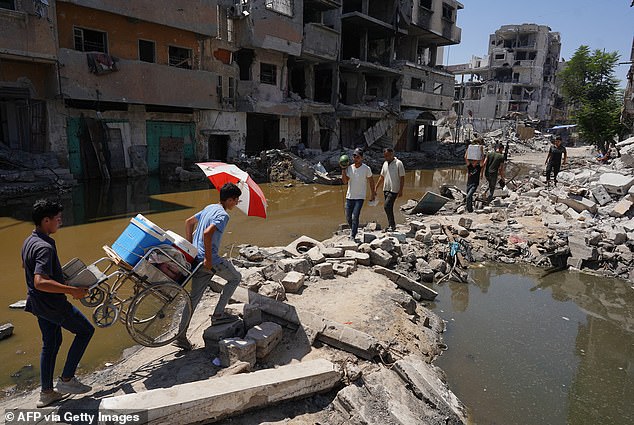Israel's presence in Palestinian territories is unlawful and settlement construction must stop, UN's top court rules - sparking fury from Netanyahu
The top UN court said Friday that Israel's presence in Palestinian territories is 'unlawful' and called for settlement construction to end immediately, sparking fury from Israeli President Benjamin Netanyahu.
In a non-binding opinion, the International Court of Justice pointed to a wide list of policies, including the building and expansion of Israeli settlements in the West Bank and east Jerusalem, use of the area's natural resources, the annexation and imposition of permanent control over lands and discriminatory policies against Palestinians, all of which it said violated international law.
The 15-judge panel said Israel's 'abuse of its status as the occupying power' renders its 'presence in the occupied Palestinian territory unlawful,' while issuing a sweeping condemnation of the country's rule over the lands it captured 57 years ago.
It says its continued presence was 'illegal' and should be ended as 'rapidly as possible.'
It added that Israel must end settlement construction immediately and that existing settlements must be removed, according to the 83-page opinion read out by court President Nawaf Salam.

Judge and President of the International Court of Justice , Nawaf Salam (R) delivers a non-binding ruling on the legal consequences of the Israeli occupation of the West Bank and East Jerusalem in The Hague on July 19, 2024. The UN's top court handed down its view, declaring 'illegal' Israel's occupation of Palestinian territories since 1967

The ICJ has ruled that Israel's settlement policy and use of natural resources in the occupied Palestinian territories violate international law. Pictured: Palestinian shepherd Mustafa Arara, 24, stands in the ruins of the West Bank Bedouin village of al-Baqa where residents fled in July after settlers established an outpost a stone's throw from the village in June.
But Netanyahu slammed the International Court of Justice, saying it had made a 'decision of lies' on Friday by ruling the county's occupation of the Palestinian territories illegal.
'The Jewish people are not occupiers in their own land - not in our eternal capital Jerusalem, nor in our ancestral heritage of Judea and Samaria' (the occupied West Bank), Netanyahu said in a statement.
'No decision of lies in The Hague will distort this historical truth, and similarly, the legality of Israeli settlements in all parts of our homeland cannot be disputed.'
Netanyahu said the West Bank and east Jerusalem were part of the Jewish people's historical 'homeland.'
Israel, which normally considers the United Nations and international tribunals as unfair and biased, did not send a legal team to the hearings.
But it submitted written comments, saying that the questions put to the court are prejudiced and fail to address Israeli security concerns.
Israeli officials have said the court's intervention could undermine the peace process, which has stagnant for more than a decade.
The court's opinion, sought by the UN General Assembly after a Palestinian request, is unlikely to effect Israel's policy.
But its resounding breadth - including saying Israel could not claim sovereignty in the territories and was impeding Palestinians' right to self-determination - could impact international opinion.
It came against the backdrop of Israel's devastating 10-month military assault on Gaza, which was triggered by the Hamas-led attacks in southern Israel.
In a separate case, the International Court of Justice is considering a South African claim that Israel's campaign in Gaza amounts to genocide, a claim that Israel vehemently denies.
Israel captured the West Bank, east Jerusalem and Gaza Strip in the 1967 Mideast war. The Palestinians seek all three areas for an independent state.

The ruling came against the backdrop of Israel's devastating 10-month military assault on Gaza, which was triggered by the Hamas-led attacks in southern Israel. Pictured: Palestinians walk on the rubble of buildings destroyed in previous Israeli bombardment, between two pools of stagnant water, in Khan Yunis in the southern Gaza Strip on July 19, 2024

Pictured: A Jewish settler comes to pray in the Eviatar outpost in the Israeli-occupied West Bank during morning prayers calling for the legalization of the outpost and the return of the hostages held in the Gaza Strip by the Hamas militant group, Sunday, July 7, 2024
Israel considers the West Bank to be disputed territory, whose future should be decided in negotiations, while it has moved population there in settlements to solidify its hold.
It has annexed east Jerusalem in a move that is not internationally recognized, while it withdrew from Gaza in 2005 but maintained a blockade of the territory after Hamas took power in 2007.
The international community generally considers all three areas to be occupied territory.
At hearings in February, then-Palestinian Foreign Minister Riad Malki accused Israel of apartheid and urged the United Nations' top court to declare that Israel's occupation of lands sought by the Palestinians is illegal and must end immediately and unconditionally for any hope for a two-state future to survive.
The Palestinians presented arguments in February along with 49 other nations and three international organizations.
Erwin van Veen, a senior research fellow at the Clingendael think tank in The Hague, said that if the court rules that Israel's policies in the West Bank and east Jerusalem breach international law, it would 'isolate Israel further internationally, at least from a legal point of view.'
He said such a ruling would 'worsen the case for occupation. It removes any kind of legal, political, philosophical underpinning of the Israeli expansion project.'
It would also strengthen the hand of 'those who seek to advocate against it' - such as the grassroots Palestinian-led movement advocating boycotts, divestment and sanctions against Israel.
He said it also could increase the number of countries that recognize the state of Palestine, in particular in the Western world, following the recent example of Spain and Norway and Ireland.'

Palestinian Foreign Minister, Riyad al-Maliki (L) greets a member of the diplomatic corps as he attends a non-binding ruling on the legal consequences of the Israeli occupation of the West Bank and East Jerusalem at the International Court of Justice

Foreign Minister of Palestine, Riyad al-Maliki (R) and Palestinian Ambassador to the United Nations, Riyad Mansour (L)
It is not the first time the ICJ has been asked to give its legal opinion on Israeli policies. Two decades ago, the court ruled that Israel's West Bank separation barrier was 'contrary to international law.' Israel boycotted those proceedings, saying they were politically motivated.
Israel says the barrier is a security measure. Palestinians say the structure amounts to a massive land grab because it frequently dips into the West Bank.
Israel has built well over 100 settlements, according to the anti-settlement monitoring group Peace Now.
The West Bank settler population has grown by more than 15 per cent in the past five years to more than 500,000 Israelis, according to a pro-settler group.
Israel also has annexed east Jerusalem and considers the entire city to be its capital. An additional 200,000 Israelis live in settlements built in east Jerusalem that Israel considers to be neighborhoods of its capital.
Palestinian residents of the city face systematic discrimination, making it difficult for them to build new homes or expand existing ones.
The international community considers all settlements to be illegal or obstacles to peace since they are built on lands sought by the Palestinians for their state.
Netanyahu's hard-line government is dominated by settlers and their political supporters. Netanyahu has given his finance minister, Bezalel Smotrich, a former settler leader, unprecedented authority over settlement policy.
Smotrich has used this position to cement Israel's control over the West Bank by pushing forward plans to build more settlement homes and to legalize outposts.





























































































































































































































































































